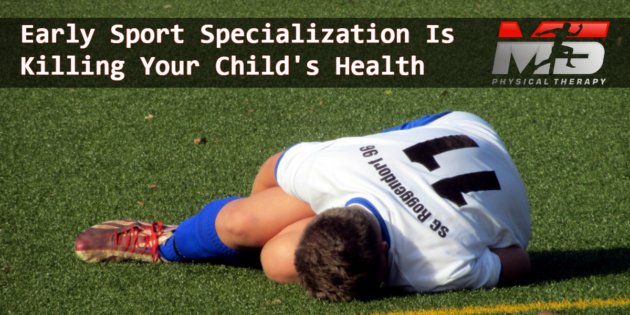Do you want to limit your kid’s athletic development and increase their chances of getting injured? Then have them specialize in one sport from an early age.
Early sports specialization (i.e. playing only 1 sport from an early age) is a booming yet concerning trend in the U.S. The social pressure to have your child specialize early has never been stronger. Parents think that more is better, that early specialization is a matter of “competitive survival,” and that their child will be unable to achieve athletic success if they don’t specialize early – and it’s simply not true.
Contrary to popular belief, early sports specialization can be more detrimental to your child than it can be beneficial. This trend is supported more by myth than by the facts. And when you look at the facts, they are quite alarming.
“We all need to think more deeply about the insanity of our youth sports culture, with its focus on early specialization in one sport, and, especially its seasons without end. There’s an assumption that specialization makes kids better at their sport, that it promotes mastery. But it doesn’t. Every expert will tell you that it absolutely doesn’t.” –Michael Sokolove, author of Warrior Girls
MYTH Early sports specialization is safe
- Athletes who specialized in one sport were 70-93% more likely to be injured than children who played multiple sports. This study surveyed 1200 youth athletes and concluded that early specialization was one of the strongest predictors of injury.
- Young athletes who spent more hours per week than their age playing one sport were 70% more likely to experience serious overuse injuries than other injuries (i.e. a 13-year-old who plays baseball 14 or more hours a week).
MYTH The best way to play a sport in college is to specialize early
- 7% of Division 1 soccer coaches said they would prefer a player who played only soccer versus a player who played multiple sports. And how many coaches do you think said they would like to see players compete in only soccer during their middle school years…..only 8.5%.
- A 2013 American Medical Society for Sports Medicine found that 88% of college athletes surveyed participated in more than one sport as a child.
MYTH Professional athletes specialized in their sport early on
- At least 82% of the top 10 athletes (in 2012) from each of the 4 major sports played multiple sports.
- A survey of the 2014 U.S women’s soccer team found that, collectively, they played 14 different sports competitively while growing up (as well as soccer). And all the players believed that playing other sports improved their success in soccer.
MYTH Early sports specialization works
- Simply put, it doesn’t work as well as people think (see the aforementioned data). Let’s take a look at some of the effects of early sport specialization and you decide if it sounds effective:
- Increased risk for physical injury
- Doesn’t guarantee future athletic success
- Can hinder overall skill development
- Limits young athlete’s long-term development & performance
- Lack of enjoyment
- Burnout
- Increased stress / negative psychological impact
- Decreased motivation
- Ignores the importance of “free play” (play without outside structure, rules, etc.)
- Think about this: children allowed free play have been shown to spend more time engaged in a sport than athletes in structured training with a coach
- Promotes the desires and interests of adults, not kids
Now let’s take a look at the other side of things and see what some of the research says about kids who played multiple sports throughout their youth:
- A 2012 study found that boys age 10-12 who played multiple sports were more physically fit, had better gross motor coordination, had more explosive strength, and had better speed/agility than those who specialized in a single sport. The author of this study, stated that “multi-sport athletes possess a broad range of physical, personal, and mental skills that help them to be successful when they start specializing in a single sport later in adolescence.”
- A study in the Journal of Sports Sciences found that young athletes who competed in 3 sports at ages 11, 13, & 15 were significantly more likely to compete at an elite national level in their preferred sport than those who specialized in only one sport at the ages of 11, 13, & 15.
Benefits of Playing Multiple Sports:
- Better overall skills and athleticism
- Better motor and athletic development (able to transfer skills from one sport to another)
- Reduced overuse injuries
- Reduced mental burnout
- Increased enjoyment
- Increased motivation
- More creative players/mindset
- Increased likelihood of participating in sports throughout life
So what should you recommend for your child to become the best athlete they can be and reduce their chance of getting injured:
Recommendations for Youth Sports Participation
- Play multiple sports (do not specialize in one sport before late adolescence)
- Young athletes should not spend more hours per week in organized sports than their ages
- Do not spend more than twice as much time playing organized sports as you spend in gym and unorganized play
- Do not play sports competitively year-round (take a 2-3 month break, not necessarily all at once)
- Instill a love of sports, don’t apply pressure (don’t turn playing sports into work for kids)
